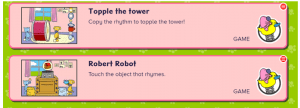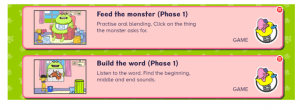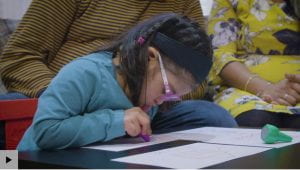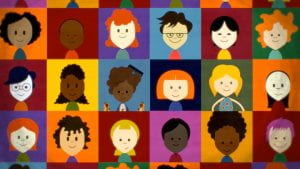We’ve decided to merge all of the Tower Hamlets Learning Advisory Service blogs into one. Come and check us out here!
Category Archives: Uncategorized
Down Syndrome Day 2022
Awareness Week 2022 – March 21st to March 25th
What does inclusion mean to you?….
The Learning Advisory Service (formerly SLS) teamed up with the Half Moon Theatre to celebrate Down Syndrome Day in 2019 and also in 2020 – just before Covid shut the project down. But we still managed to have great fun!
This years focus is, rightly, on inclusion. We’re all missing out if everyone isn’t included.
We’d love to hear how your school is celebrating Down Syndrome Awareness Week for 2022.
We really like this website for great ideas for supporting your child at home. Click on the picture to view the video clip. This one is all about making flash cards to support literacy:
#SpeakUpForCovidGen
speaking-up-for-the-covid-generation-i-can-report
@icantalk’s latest report paints a worrying picture
for children’s speaking and understanding –
@educationgovuk needs to act.
Read the full findings
and recommendations now at bit.ly/3hnQCW2.
We’re adding our voice to @icantalk’s call to action
and speaking up for the Covid generation. Will you?
Join the conversation and #SpeakUpForCovidGen

November 24th is No Pens Wednesday
What is No Pens Wednesday?*
It is a national day dedicated to speaking and understanding language which takes place in schools and settings annually. Click on the picture above, or link below to sign up and get lots of ideas to try in your class. There are ideas for Early Years, Primary and Secondary.
Why take part?
Speaking and understanding language are often overlooked in the UK education system in comparison to written language skills. However, as with literacy and numeracy, schools can play a crucial role in developing children’s skills in this important area.
No Pens Day Wednesday puts speaking and understanding language in the spotlight. Through a day of fun and engaging activities, schools and
settings can:
Raise awareness of the importance of speaking and understanding skills with staff, children and families.
Improve children and young people’s speaking and understanding skills and increase their engagement in lessons.
Support their curriculum’s focus on speaking and understanding language, and develop staff skills and confidence in teaching speaking and understanding skills.
Identify children who may have speech, language and communication needs and provide additional support.
Why is it so important?
Language levels at age two predict reading, writing and maths ability when children start school.
As many as 50% of children in some areas of social disadvantage start school with delayed language. Without early support, these children may struggle to catch up with their peers.
In Primary School:
Children who have difficulties speaking and understanding language are at a higher risk of behavioural, social and emotional difficulties in childhood and through adolescence.
More than 90% of children who have persistent language difficulties at age 5 have literacy difficulties at age 15.
In Secondary School:
Good communication skills are rated as the most important employability skills needed for young people entering their first job – from a survey of schools, employers and politicians.
Up to 88% of long-term unemployed young men may have speech, language and communication needs.
*taken from the ICAN guide to the day
#ThinkLanguage #ThinkDLD
15th October is Developmental Language Disorder Awareness Day
Find out more at RADLD – click the link below and share with your colleagues
https://towerhamletssls.edublogs.org/files/2021/10/3-DLD- -Tree-v2-1.pdf
-Tree-v2-1.pdf
Download the DLD Strategy Tree to print out in your setting. Click the picture above
DLD 1 Difficulties Talking and/or Understanding
Developmental Language Disorder is a diagnosis given when a child or adult has difficulties talking and/or understanding language
- Involves difficulties with spoken language
- Affects children and persists into adulthood
- creates obstacles to communication at school, work and in everyday life
- has no known cause although it may run in families
DLD 2 Hidden But Common
DLD is hidden and affects approximately 2 children in every classroom impacting on literacy, learning, friendships and emotional well-being
- Can be missed, misdiagnosed or misinterpreted as poor behavior, poor listening or inattention
- Was found in 7.5% of 4-5 year olds in a recent study
- Affects a child’s ability to learn at school because learning is mainly through language
- Affects reading or writing and is often linked with dyslexia
- Can be socially isolating; joining in with conversations and activities with peers can be harder, there is an increased vulnerability to bullying
- Increases the risk of lower academic achievement
- Can be associated with behavioral and/or mental health problems, unemployment and economic disadvantage
DLD 3 Support Can Make A Real Difference
Support from professionals, including speech and language therapists and teachers, can make a real difference
- It is important that DLD is identified so individuals can be adequately supported
- Speech and language therapists and specialist teachers can help those with DLD to develop skills and strategies, and to understand their difficulties and their strengths
- DLD can be a long term difficulty thus adults with DLD may also need support and adjustments in the work place
- Individuals with DLD are sociable and with appropriate support can have satisfying lives, with friendships, families, contributing to their community
Are you supporting pupils with Down Sydrome?
The Down Syndrome Education International group have free videos online to view
They offer practical guidance to support effective early intervention and education for children with Down syndrome
There are three videos on their website:
-
Activities for Babies with Down Syndrome
-
Speech and Language Activities for Pre-school children with Down Syndrome
-
Inclusion in Practice- Educating children with Down Syndrome at Primary Schools
Dyslexia Awareness Week 2021 – navigating this blog
Welcome to the Blog of the Language and Literacy Team from the new Learning Advisory Service. Below, you will find posts containing a YouTube video on Seeing Dyslexia Differently, Dyslexia Friendly Classrooms and information on how to use Busy Things from LGFL to develop phonics and phonological skills.
Click on the Specific Learning Difficulties heading in the blue bar above and you will find a range pages to support parents and teachers with study skills, reading, spelling and handwriting
- Helping primary pupils with reading at home
- Supporting secondary students with reading
- Tips for helping your child with their homework (primary)
- Helping secondary students with study skills and homework
- Helping to learn spellings
- Learn to read and spell Common Exception (High Frequency) Words
- Help your child with phonics
- Tips for improving your child’s handwriting
- Using games for literacy learning
- FAQ about supporting literacy
See Dyslexia Differently- video from BDA
Click the image above to see this short YouTube video from the British Dyslexia Association. It explores the possible difficulties and strengths of young people with dyslexia. It is three minutes long.
The video could be used pupils, parents, teachers and teaching assistants.
Dyslexia Awareness Week is:
October 4th-8th October 2021
Is Your Classroom Dyslexia-Friendly?
 It’s widely accepted that about 10% of the population is dyslexic (with about 4% significantly so), so dyslexic learners will make up part of your classes in your schools/settings. How confident are you that you are meeting their needs?
It’s widely accepted that about 10% of the population is dyslexic (with about 4% significantly so), so dyslexic learners will make up part of your classes in your schools/settings. How confident are you that you are meeting their needs?
If a parent asks you what you are doing to make your classroom dyslexia-friendly, would you be comfortable giving an answer?
It’s easy to feel nervous around the term dyslexia – it’s a broad term that can be hard to pin down or define precisely. Teachers may assume that a dyslexic learner will need specialist equipment such as coloured overlays or specific dyslexia programmes.
The good news is that many of the inclusive strategies that you use routinely in your day-to day practice will be dyslexia-friendly and reminding yourself of what you are already doing can be a helpful exercise – make visible what may have become invisible to you.
Here’s are 10 Dyslexia-Friendly strategies that you will almost certainly already be using every day:
- Think about purposeful seating – can the pupils see you/the board clearly?
- Think about grouping/setting – is the pupil able to work at their cognitive level with others who will stimulate and provide good role models?
- Give instructions in small chunks – break tasks down and give one step at a time – provide written reminds and repeat when requested
- Present information in a range of ways to ensure that learners can access through a range of learning channels – use visuals wherever possible
- Allow plenty of thinking time – Talk Partners is a good way of giving time to think and rehearse information
- Don’t ask struggling readers to read out loud in front of others
- Allow pupils to demonstrate learning using a range of formats so that literacy is not a barrier – eg drawing, mind mapping, creating lists & diagrams, oral presentations, role play, debates, etc
- Focus on strengths – feedback on content rather than areas of difficulty eg spelling or handwriting
- Create an ethos within the classroom where it’s okay to ask for help & make sure learners know where to go for support when they need it
- Avoid asking your learner to copy from the board – if copying is necessary give the pupil a sheet to copy from that they can have in front of them – better still provide a printed copy for them to stick in, use paired/shared writing, write for the learner, etc
If you would like to do a more thorough audit of your practice to check how inclusive you are, have a look at this Audit of General Teaching Strategies for Pupils with Specific Literacy Difficulties.
Using Busy Things to develop phonological awareness skills
Using Busy Things to develop phonological awareness skills
Almost all schools now offer a literacy curriculum based on systematic synthetic phonics which most children respond really well to. But, there is a small group of pupils that don’t make the progress that we expect. 
The building blocks to good phonic skills include really strong phonological awareness skills (the ability to identify and manipulate sounds in spoken language e.g. syllables, rhyme etc.) and phoneme awareness (manipulating individual sounds). Research shows that the majority of pupils that go on to struggle with spelling, reading and writing have a relative difficulty with their phoneme awareness and other phonological skills. This group need extra time and attention.
Early Years settings are brilliant at developing phonological awareness skills, but as children move up into Key Stage 1 and beyond, it becomes harder for class teachers to find time to spend time on this.
One useful resource, available to all schools with access to the London Grid for Learning is Busy Things. We found their phonic games very helpful when supporting children during lockdown, as they develop phonological awareness as well as phonics.
They updated a lot of the materials in May 2021. We like the way you can customize the games to concentrate on specific grapheme phoneme correspondences.
Games
Our pupils loved the games. There are games to support rhyming skills such as Topple the Tower and Robert Robot:

As well as games like Feed the Monster and Build the Word which focus on oral blending and segmenting:

The software allows you to choose which scheme you want to follow, as well as your regional accent preference (north or south of England):
Once pupils are confident at using the games online, you can also produce pdf’s of specific patterns to reinforce areas that they are working on. This was useful to set as targeted homework.
Busy things does not replace the work we need to do to help strengthen phonological awareness skills but it is a really useful tool. Children can independently use the game on laptops during class reading time or other pockets of the school day.
Teachers can set up class profiles and monitor how their pupils are doing.
For more information, there are youtube videos on how to get started, as well as tutorials online. Alternatively, do contact us for more information. While not experts, we are happy to share what we have learnt!
Tower Hamlets Language, Literacy and Communication Team
September 2021










